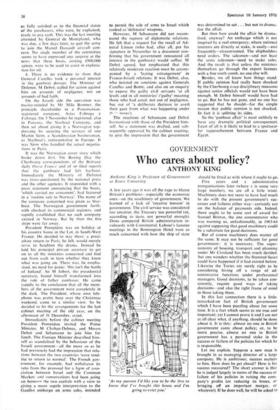GOVERNMENT
Who cares about policy?
ANTHONY KING
Anthony King is Professor of Government at Essex University A few years ago it was all the rage to blame Britain's problems—especially the economic ones—on the machinery of government. We learned of a lack of 'creative tension' in government. The civil service was considered too amateur, the Treasury too powerful (or, according to taste, not powerful enough). Dons compared British administration in- vidiously with Continental. Labour's famous meetings in the Bonnington Hotel were as much concerned with how the ship of state 'As my parents I'd like you to be the first to know that I've bought this house and I'm going to evict you.' should be fitted as with where it ought to go.
Five years and x administrative reorganisations later (where x is some very large number), we are all a little wiser. Machinery does not seem to have had much to do with the present government's suc- cesses and failures either way—certainly not on the balance of payments side. Indeed, there ought to be some sort of award for Samuel Brittan, the one commentator who was warning us, unfashionably, in 1963-64 against supposing that good machinery could be a substitute for good decisions.
But of course machinery does matter all the same. It may not be sufficient for good government: it is necessary. The super- ministry of housing, transport and planning under Mr Crosland has been much derided, but one wonders whether the Stansted fiasco could have happened if it had existed before. Likewise the Tories are surely right to be considering hiving off a range of ad- ministrative functions under professional managers. Good decisions, to be taken con- sistently, require good ways of taking decisions—and also the right frame of mind in those taking them.
In this last connection there is a little- remarked-on fact of British government which I have been puzzling about for some time. It is a fact which seems to me true and important; yet I cannot prove it and I am not at all clear what, if anything, should be done about it. It is this: almost no one in British government cares about policy; or, to be more precise, almost no one in British government has a personal stake in the success or failure of the policies for which he is responsible.
Let me explain. Suppose a new man is brought in as managing director of a large company. He is ambitious; success matters to him. How does he get ahead? How is his success measured? The short answer is that he is judged largely in terms of the success or failure of his policies in raising the com- pany's profits (or reducing its losses, or bringing off an important merger, or whatever). If he does well, he will be asked to
stay on; he may receive an attractive offer from another firm. If company profits, slump, he is unlikely to survive for long.
Contrast this with the position of a new minister. The new minister can be quitecon- fident that he will not have to live with the consequences of his own policies. On the contrary, the chances are, if the department is a big one, that he will have to live with the consequences of the policies of several generations of his predecessors. Most of the important actions of government work themselves out only over a long time. Ministers today may feet intense political heat in connection with (say) the choice of a site for London's third airport; but it is their successors in twenty years' time who will feel the full impact of whatever mistakes are made—or not made—today.
So much is obvious. The other half of the argument is perhaps less so. It is not simply that ministers do not survive as long as the effects of their policies. It is not even that ministers stay in particular jobs for such short periods—two or three years on average. It is that most ministers, even before they go to work on their first morn- ing, believe they will not remain where they are for long. Like the business man, they know that the penalty for failure is removal. Unlike the business man, they know that the reward for success is also removal: to another job elsewhere in the hierarchy.
And how, in this position, does the minister think his success will be measured? Partly by his performance in the House of Commons, partly by the kind of impression he makes at ministerial meetings, partly by his competence as an administrator (in the narrow sense). But however he is judged—by his contemporaries or even by posterity—it is hardly likely to be in terms of the success or failure of his policies. There will not be enough time. And, in advance, the minister knows it.
Of course, other motives besides ambition could inspire in a man a passion for 'think- ing long'. But in Britain one of the most im- portant of these motives scarcely operates. Very few ministerial posts are occupied today—or have been for many years past—by men with a sense of policy voca- tion. The penal reformer becomes Chan- cellor, the Chancellor penal reformer; the one recently ran aviation, the other criticised Colonial Secretaries. Both men are able; neither has ever conceived of penal reform or economic management or aviation as his life's work.
To be sure, the argument, put like this, is a caricature. Businessmen are not judged solely on the basis of their observed performance. Many ministers—Mr Cross- man and Mr Crosland in the present Government—obviously do care about policy. And some ministers' policy chickens do come home to roost so fast that the fates of policy and minister are merged. Witness the careers of Strachey, Eden, Selwyn Lloyd, and Callaghan himself. Even so, it seems to me that a core of truth remains : the man who believes his comfort, his reputation, his wealth, his place in history depend on how the decisions he takes now will look in ten years' time is likely to approach his work in a very different spirit from the man who can cheerfully bequeath his mistakes to his successors confident that few, if any, will remember that the mistakes were indeed his.
One does not want to push all this too far. The man too conscious of the future may be too cautious; the man who has some field of policy as his vocation may not be cautious enough. British ministers are conscientious. They are mainly bright for at least as bright as anybody else's). Rapid turnover ensures that those who move up and not out have an impressive breadth of experience. In the background there is always the electorate waiting to punish an administration whose policies have gone wrong—or, equally com- monly, have not yet gone right.
Perhaps in the end it does not matter. It may be that, if the results of the lack of con- cern with policy are unfortunate they are neVertheless offset by other, more important factors—for instance the civil service's efficiency and continuity. I hope so. I half imagine so. Yet, as I watch myself and my colleagues trying to create a great university, I wonder whether we would do our job even as well as we do if we (a) did not care much about universities and (b) were all pretty confident that we were going to be somewhere else in two or three years' time.
If this is a genuine worry about British government, can anything be done about it? One possibility suggests itself straight away: the introduction, where possible, of measures of government performance analogous to profits in industry. This is one aim of the Hiss (programming—planning—budgeting system) technique used extensively in America and increasingly here. But, as American experience makes plain, govern- ment 'outputs' are not all quantifiable and, even when they are, there are still legitimate disputes over what the aims of government should be and over priorities. Apolitical politics as impossible as it is undesirable.
For the rest, it would help if Prime Ministers played musical chairs with their ministers less often, and announced in ad- vance that, short of proven incompetence, ministers could expect some reasonable security of tenure. Backbench frustration would be a bit more bearable if all alike were frustrated; the number of discontented ex- ministers would be diminished. It would help if ministers, when they were moved, took on tasks in some way related to the work they had done before. It would help, too, if knowledge of particular policy areas were more often rewarded with appropriate ministerial office. The Crosland-Stewart switch of 1964 is still one of the odder things Mr Wilson has done.
All these things might help. Certainly none of them is impossible. But equally none of them—or all of them together—would make a startling difference. Government is just like that. But when all governments live so con- stantly on the margin, even marginal benefits should bear thinking about.



































 Previous page
Previous page